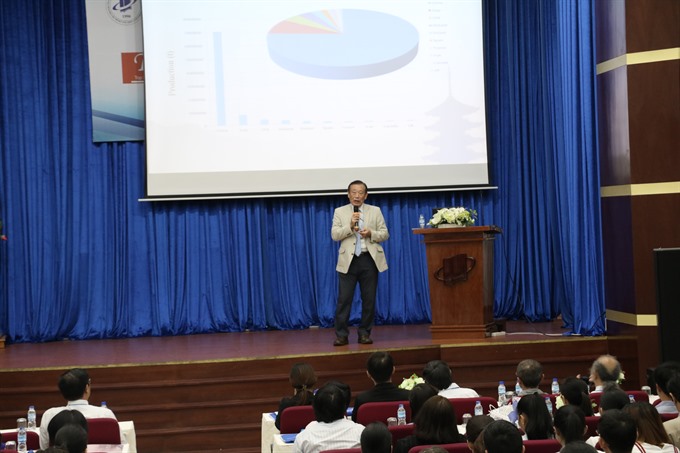 Society
Society

The results of research on biotech applications such as microbial bio-pesticides have helped foster sustainable agricultural growth in Việt Nam, according to scientists.
 |
| An international conference in HCM City discussed the latest research in biotechnology as it relates to agriculture and medicine. Photo courtesy of HCM City Open University |
HCM CITY — The results of research on biotech applications such as microbial bio-pesticides have helped foster sustainable agricultural growth in Việt Nam, according to scientists.
Bio-pesticides, for example, have been used in coffee and pepper crops, two of the seven main perennial crops of Việt Nam, Dr Phạm Nguyễn Đức Hoàng of the Biotechnology Centre of HCM City, said at an international conference on biotech research and application held yesterday at HCM City Open University.
Most microbial bio-pesticides are used to control plant pathogenic fungi and nematodes.
“The main purposes of microbial fertilisers for these crops are for nitrogen fixation, decomposition of organic matter, and nutrient absorption,” he said, adding that many microorganisms are used in fertilisers and bio-pesticides help to increase crop yield.
The Biotechnology Center was able to create bio-products for these purposes using domestic microorganisms collected in southern Việt Nam, Hoàng said.
Biochar from coffee husks and other crop waste can be used to enhance the effect of microbial products, he said.
“The process improves crop quality and yield, decreases the use of chemical farming, and maintains the sustainability of the agricultural ecosystem,” he added.
Associate Professor Nguyễn Anh Dũng of Tây Nguyên University said that bio-tech products were needed in the Central Highlands region, where agriculture plays an important role, to maintain sustainable development.
Microbiological biotechnology, nanotechnology and enzymatic biotechnology should be the focus of more research, Dũng said.
The conference, which was held by HCM City Open University, also heard presentations from Japanese and Thai scientists on biotech research and application in agriculture.
Professor Akira Suzuki of Tokyo City University said that automated technology used in mushroom cultivation was effective but that its use was still not widespread.
Mushroom companies are also eager to apply new technologies to save energy during cultivation. LED lights, for example, are used instead of fluorescent lamps, especially during budding and growth.
In a related matter, Dr Takashi Yamanaka of Japan’s Forestry and Forest Products Research Institute, gave a presentation on the cultivation of the Tricholoma matsutake, one of the most economically important edible ectomycorrhizal mushrooms in the world.
Pharmaceutical biotechnology, a relatively new field, involves the discovery and development of biomedicine.
In Việt Nam, many biomedicines, including therapeutic drugs as well as kits for diagnosis and prognosis of human diseases, are now available. —VNS




